#Nightwood Theatre
Text
A Poem for Rabia's Floats Sweet and Tight at Tarragon Toronto
#frontmezzjunkies reviews:
#APoemForRabia
written by #NikkiShaffeeullah
co-directed by #ClarePreuss & #DonnaMichelleStBernard
w/ #VirgiliaGriffith
#MichelleMohanned
#AdeleNoronha
#JayNorthcott
#AnandRajaram
@TarragonTheatre
#PoemForRabia
#Tarragon2324
Michelle Mohammed, Nikki Shaffeeullah, and Adele Noronha in A Poem for Rabia – Tarragon Theatre 2023 – Photo by Cylla von Tiedemann
The Toronto Theatre Review: Tarragon Theatre’s A Poem for Rabia
By Ross
The women speak of the land of many waters, political convenience, and the abolishing of prisons, hundreds of years apart. She fears. She goes, always in motion but sometimes completely still.…

View On WordPress
0 notes
Text
Tues. Sept. 19: Re-envisioning the Week
image courtesy of Sh1ra from pixabay.com
Tuesday, September 19, 2023
Waxing Moon
Pluto, Saturn, Neptune, Chiron, Uranus, Jupiter Retrograde
Partly sunny/cloudy and cool
I hope you had a good weekend! Ready for our regular Tuesday catch-up?
Today’s serial episode is from Legerdemain:
Episode 121: Brother Risipi Comes to Help
Shelley enlists the monk to help the forger.
Legerdemain Serial…

View On WordPress
#ALCHEMY OF A BLACKBIRD#Boiler House Poets Collective#book review#books#Caryl Churchill#client work#CVS#CVS lies#episode videos#graphics#grocery#Harvey Fierstein#Ink-Dipped Advice#jury duty#Legerdemain#library#Michael&039;s#Moderna#Nightwood Theatre#notebooks#Pfizer#Pittsfield#Remedios Varos#residency application#rest#stress management#submissions#TD Bank Class Action Suit#THE MOMEN ON THE BRIDGE#vaccine cancellation
0 notes
Text


studio180theatre How well do you know the cast of FOUR MINUTES TWELVE SECONDS?
We've made the announcement, and you've seen their names, but lets get to know this exceptional cast a little better..
- MEGAN FOLLOWS AS DI Canadian screen icon Megan Follows returns to the stage after more than a decade! Best known for her unforgettable portrayals of Anne Shirley in Anne of Green Gables and Catherine de' Medici on Reign, among many, many others. She was last seen on stage in Toronto in The Penelopiad with Nightwood Theatre...
...Running for a limited engagement from April 20 to May 12 at Tarragon Theatre Extraspace, in association @tarragontheatreto...Photos of the cast by Dahlia Katz.
2 notes
·
View notes
Text
some stuff i liked this year
Theatre
Oratorio for Living Things // Heather Christian
Evanston Salt Costs Climbing // Will Arbery
Nightclub Cantata // Liz Swados
Long Day’s Journey Into Night // Eugene O’Neil
Chekhov’s First Play // Anton Chekhov
The Skin of our Teeth // Thorton Wilder
Leopoldstadt // Tom Stoppard
Assassins // John Weidman, Stephen Sondheim
Topdog/Underdog // Suzan Lori-Parks
Suffs // Shaina Taub
Film
New Releases
Nope // Jordan Peele
Decision to Leave // Park Chan-wook
Petite Mamam // Céline Sciamma
Everything Everywhere All at Once // Daniels
First Watches
The Umbrellas of Cherbourg // Jacques Demy
Secrets and Lies // Mike Leigh
Le bonheur // Agnes Varda
Fanny and Alexander // Ingmar Bergman
Queen Christina // Rouben Mamoulian
High and Low // Akira Kurosawa
The Long Day Closes // Terrance Davies
Desert Hearts // Donna Deitch
Three Colors: Red // Krzysztof Kieślowski
Tampopo // Juzo Itami
Music
New Releases
Dragon New Warm Mountain I Believe in You // Big Thief
Bleed Out // The Mountain Goats
Magnificent Bird // Gabriel Kahane
Ants From Up There // Black Country, New Roads
Laurel Hell // Mitski
Crash // CharliXCX
Flood // Stella Donnelly
No Rules Sandy // Sylvan Esso
Experts in a Dying Field // The Beths
How Is It That I Should Look at the Stars? // the Weather Station
First Listens
Miami Memory // Alex Cameron
Have One On Me // Joanna Newsom
The Liz Swados Project // Various artists
The Umbrellas of Cherbourg // Michel Legrand
Turbulent Indigo // Joni Mitchell
Ravel and Prokofiev // Margaret Argerich and Berlin Philharmonic
Vulture Prince // Arooj Aftab
Judee Sill // Judee Sill
The First Songs // Laura Nyro
Pure Comedy // Father John Misty
Books
Nightwood // Djuana Barnes
Always Coming Home // Ursula K Le Guin
Nona the Ninth // Tamsyn Muir
Orientalism // Edward Said
Giovanni’s Room // James Baldwin
Orlando // Virginia Woolf
Imago // Octavia Butler
The Ministry for the Future // Kim Stanley Robinson
Why Fish Don’t Exist // Lulu Miller
Broken Earth Trilogy // NK Jemisin
TV
I don’t watch enough so just Severance!
4 notes
·
View notes
Text
Ch 4 Eternal devotion
The painted sun swung in the background of the stage as a raven harpie walked on stage, gold dusting the dark beak complimenting his red and gold clothing. He starts singing about how his life is perfect but he still feels empty like something is missing. Nightwood's singing is joined in by the main love interest Denval, Nightwood looks on in admiration at her voice, her eyes obscured by a blush mask and a lotus on it. Their duet goes on for a bit as they bond. After a while they get married, but the music suddenly shifts from whimsical to dramatic and harsh. The painted sun is taken offstage replaced with Clouds and lightning, the sound of thunder and rain wafts around the theatre. A shadowed figure vaguely shaped like a moth, swoops in and slashes nightwood’s back causing him to fall.
0 notes
Text
you know what i just realized: we never attribute the starkid shows to their individual writers or directors. like when someone is talking about a show they never say “oh it was made by nick and matt lang (and insert which ever other collaborators are attributed to a single show)” like everyone always attributes the shows to the whole company unlike with a lot of other theatre (there are some exceptions especially in canadian theatre like for example nightwood theatre). anyways i just think it’s really nice that the starkid audience (and the company itself from what i can glean) considers their works to belong to everyone involved in creating and putting their shows up and not just the writers or directors!
58 notes
·
View notes
Text
reading list for 2020
2019 reading list
literature recommendations
last updated 7.1.2020
crossed = finished
bolded = currently reading
plain = to read
* = reread
+ = priority
ask if you want PDFs!
currently reading:
The Brutality of Fact: Interviews with Francis Bacon by David Sylvester
We Eat Our Own by Kea Wilson
Frankissstein by Jeanette Winterson
Inferno by Dante Aligheri
novels (unsorted)
The Border of Paradise by Esmé Weijun Wang
+Justine by Lawrence Durrell
Blood Meridian by Cormac McCarthy
+Death in Venice by Thomas Mann*
The Robber Bride by Margaret Atwood
The Name of the Rose by Umberto Eco*
The Letters of Mina Harker by Dodie Bellamy
Story of the Eye by Georges Bataille
+Nightwood by Djuna Barnes
+Malina by Ingeborg Bachman
A Girl is a Half-Formed Thing by Eimear McBride
Monsieur Venus by Rachilde
+The Marquise de Sade by Rachilde
+A King Alone by Jean Giono
+The Scarab by Manuel Mujica Lainez
+The Invitation by Beatrice Guido
Operation Massacre by Rodolfo Walsh
She Who Was No More by Boileau-Narcejac
Mascaro, the American Hunter by Haroldo Conti
European Travels for the Monstrous Gentlewomen by Theodora Goss
Kiss Me, Judas by Christopher Baer
Possession: A Romance by A.S. Byatt
The Grip of It by Jac Jemc
Celestine by Olga Ravn
The Girl Who Ate Birds by Paul Nougé
The Necrophiliac by Gabrielle Wittkop
Possessions by Julia Kristeva
classics
The Decameron by Giovanni Boccaccio*
Purgatio by Dante Aligheri
Paradiso by Dante Aligheri
short story collections
The Wilds: Stories by Julia Elliot
The Dark Dark: Stories by Samantha Hunt
Severance by Robert Olen Butler
Enfermario by Gabriela Torres Olivares
Sirens and Demon Lovers: 22 Stories of Desire edited by Ellen Datlow and Terri Windling
The Beastly Bride edited by Ellen Datlow
+Vampire In Love by Enrique Vila-Matas
Collected works of Leonora Carrington
Collected works of Silvina Ocampo
Collected works of Everil Worrel
Collected works of Luisa Valenzuela
theatre
+Faust by Goethe
The Tragical History of Doctor Faustus by Christopher Marlowe
Phaedra’s Love by Sarah Kane
nonfiction (unsorted)
Countess Dracula by Tony Thorne
+The Bloody Countess by Valentine Penrose
Infamous Lady: The True Story of Countess Erzsebet Bathory by Kimberly L. Craft
Blake by Peter Akroyd
Lives of the Necromancers by William Godwin
A History of the Heart by Ole M. Høystad
On Monsters by Stephen T. Asma
+Ghostly Matters: Haunting and the Sociological Imagination by Avery Gordon
+Consoling Ghosts : Stories of Medicine and Mourning from Southeast Asians in Exile by Jean M. Langford
essays (unsorted)
When the Sick Rule the World: Essays by Dodie Bellamy
Academonia: Essays by Dodie Bellamy
‘On the Devil, and Devils’ by Percy Shelley
+An Erotic Beyond: Sade by Octavio Paz
poetry
+100 Notes on Violence by Julia Carr
academia (unsorted)
Essays on the Art of Angela Carter: Flesh and the Mirror edited by Lorna Sage
The Routledge Companion to Literature and Food edited by Lorna Piatti-Farnell, Donna Lee Brien
Cupid’s Knife: Women's Anger and Agency in Violent Relationships by Abby Stein
Traumatic Encounters in Italian Film: Locating the Cinematic Unconscious by Fabio Vighi
The Severed Flesh: Capital Visions by Julia Kristeva
Feast and Folly: Cuisine, Intoxication, and the Poetics of the Sublime by Allen S. Weiss
on horrror
Terrors in Cinema edited by Cynthia J. Miller and A. Bowdoin Van Riper
Robin Wood on the Horror Film: Collected Essays and Reviews by Robin Wood
Monster Theory: Reading Culture by Jeffrey Cohen
The Philosophy of Horror, or Paradoxes of the Heart by Noël Caroll
Dark Dreams 2.0: A Psychological History of the Modern Horror Film from the 1950s to the 21st Century by Charles Derry
Monsters of Our Own Making by Marina Warner
Monster Culture in the 21st Century: A Reader edited by by Marina Levina and Diem My Bui
the gothic
Woman and Demon: The Life of a Victorian Myth by Nina Auerbach
Skin Shows: Gothic Horror and the Technology of Monsters by J. Halberstam
+Perils of the Night: A Feminist Study of Nineteenth-Century Gothic by Eugenia C. Delamotte
Art of Darkness: A Poetics of Gothic by Anne Williams
Body Gothic: Corporeal Transgression in Contemporary Literature and Horror Film by Xavier Aldana Reyes
On the Supernatural in Poetry by Ann Radcliffe
The Gothic Flame by Devendra P. Varma
Gothic Versus Romantic: A Reevaluation of the Gothic Novel by Robert D. Hume
A Philosophical Enquiry into the Origin of our Ideas of the Sublime and Beautiful by Edmund Burke
Over Her Dead Body by Elisabeth Bronfen
The Contested Castle: Gothic Novels and the Subversion of Domestic Ideology by Kate Ellis
Gothic Documents: A Sourcebook, 1700-1820 by E. Clery
Limits of Horror: Technology, Bodies, Gothic edited by Fred Botting
The History of Gothic Fiction by Markman Ellis
The Routledge Companion to the Gothic edited by Catherine Spooner and Emma McEvoy
Gothic and Gender edited by Donna Heiland
Romanticism and the Gothic Tradition by G.R. Thompson
Cryptomimesis : The Gothic and Jacques Derrida’s Ghost Writing by Jodie Castricano
bluebeard
Bluebeard’s legacy: death and secrets from Bartók to Hitchcock edited by Griselda Pollock and Victoria Anderson
The tale of Bluebeard in German literature: from the eighteenth century to the present Mererid Puw Davies
Bluebeard: a reader’s guide to the English tradition by Casie E. Hermansson
Bluebeard gothic : Jane Eyre and its progeny Heta Pyrhönen
Bluebeard Tales from Around the World by Heidi Ann Heiner
religion
The Incorruptible Flesh: Bodily Mutation and Mortification in Religion and Folklore by Piero Camporesi
Afterlives: The Return of the Dead in the Middles Ages by Nancy Caciola
Discerning Spirits: Divine and Demonic Possession in the Middle Ages by Nancy Caciola
“He Has a God in Him”: Human and Divine in the Modern Perception of Dionysus by Albert Henrichs
The Ordinary Business of Occultism by Gauri Viswanathan
The Body and Society. Men, Women, and Sexual Renunciation in Early Christianity by Peter Brown
cannibalism
Eat What You Kill: Or, a Strange and Gothic Tale of Cannibalism by Consent Charles J. Reid Jr.
Consuming Passions: The Uses of Cannibalism in Late Medieval and Early Modern Europe by Merrall Llewelyn Price
Cannibalism in High Medieval English Literature by Heather Blurton
+Eating Their Words: Cannibalism and the Boundaries of Cultural Identity edited by Kristen Guest
Dinner with a Cannibal: The Complete History of Mankind’s Oldest Taboo by Carole A. Travis-Henikoff
crime
Savage Appetites by Rachel Monroe
In Cold Blood by Truman Capote
The Mind Hunter: Inside the FBI’s Elite Serial Crime Unit by John Douglass
theory/philosophy
Life Everlasting: the animal way of death by Bernd Heinrich
The Ambivalence of Scarcity and Other Essays by René Girard
Interviews with Hélène Cixous
Symposium by Plato
Phaedra by Plato
Becoming-Rhythm: A Rhizomatics of the Girl by Leisha Jones
The Abject of Desire: The Aestheticization of the Unaesthetic in Contemporary Literature and Culture edited by Konstanze Kutzbach, Monika Mueller
The Severed Head: Capital Visions by Julia Kristeva
perfume & alchemy
Perfume: The Alchemy of Scent by Jean-Claude Ellena
The Perfume Lover: A Personal Story of Scent by Denyse Beaulieu
Past Scents: Historical Perspectives on Smell by Jonathan Reinarz
Fragrant: The Secret Life of Scent by Mandy Aftel
Das Parfum by Patrick Süskind*
Scents and Sensibility: Perfume in Victorian Literary Culture by Catherine Maxwell
The Foul and the Fragrant by Alain Corbin
+throughsmoke by Jehanne Dubrow
“The Ugly History of Beautiful Things: Perfume” by Katy Kelleher
medicine
The Butchering Art by Lindsey Fitzharris
Finished
(Vampires): An Uneasy Essay on the Undead in Film by Jalal Toufic
114 notes
·
View notes
Photo



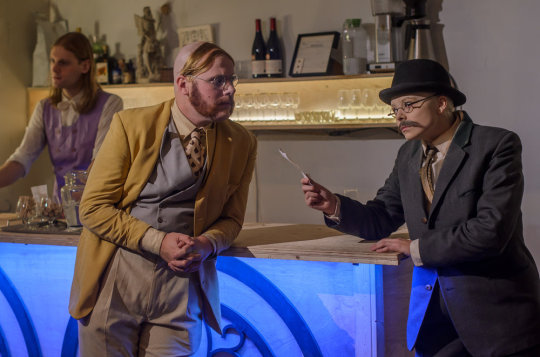
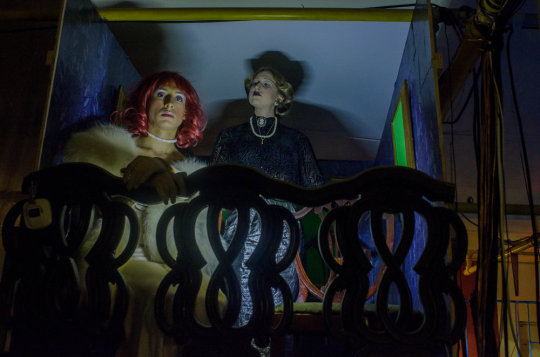
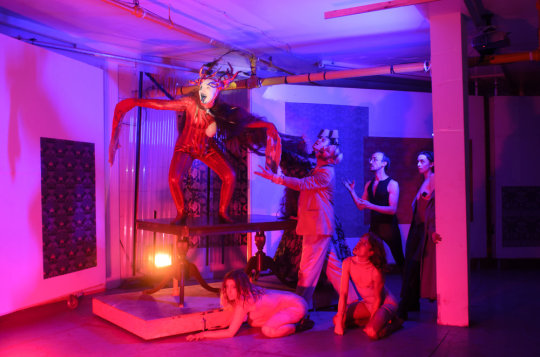
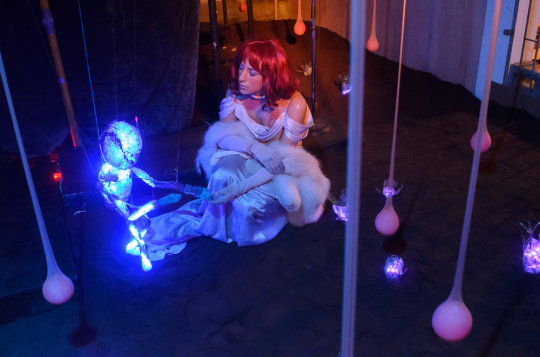

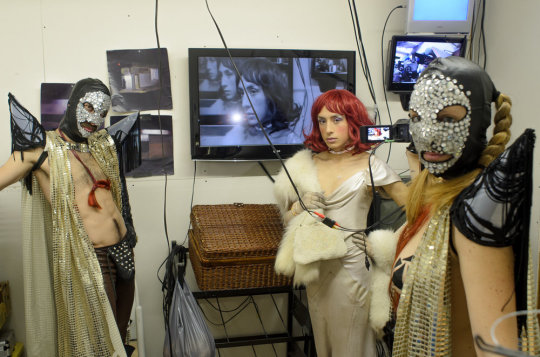
LA SOMNAMBULE
october 18 - 28, 2018
“I have come to ask you to tell me everything about the night”
An interdisciplinary theatrical event where participants explore and reflect on the queerness of the night - a perambulating, immersive performance inspired by Djuna Barnes' Nightwood.
NOMINATED FOR OUTSTANDING INDEPENDENT PRODUCTION,
OUTSTANDING COSTUME DESIGN,
OUTSTANDING CONTRIBUTION TO THEATRE,
OUTSTANDING LEAD ACTOR (GABE MAHARJAN)
BY MONTREAL ENGLISH THEATRE AWARDS
+ CREATIVE TEAM
Director | Anthony Kennedy
Writers | Rhiannon Collett & Joseph Shragge
Dramaturg | Kyle Croutch
Technical director | Vladimir Cara
Production & stage manager | Trevor Barrette
Assistant stage manager | Kate Stockburger
Set designer | Robert Leveroos
Costume designer | Sophie El-Assaad
Lighting designer | Jon Cleveland
Sound designer | Devon Bate
Video designer | Julia Milz
Composition | Jeremy Dutcher
Graphic design | Dan Buller
Logo design | Heath Cairns
Box Office manager | Roxane Loumede
+ CAST
Jillian Harris
Tyson Houseman
Robert Leveroos
Gabe Maharjan
Julia Milz
Alex Petrachuk
Meagan Schroeder
Gabriel Schultz
The creation of this work was made possible thanks to the financial support of the Conseil des arts et des lettres du Québec.
We acknowledge the support of the Canada Council for the Arts, which last year invested $153 million to bring the arts to Canadians throughout the country.
0 notes
Text
Calpurnia
Feb. 04 2018 2:30 PM
90 minutes no intermission
Buddies in Bad Times Theatre
A Nightwood Theatre and Sulong Theatre co-production
Written and Directed by Audrey Dwyer
According to their program, this play is “A classic novel turned on its head. A dinner party gone wrong.” This is about as vague as preliminaries get, and I find out why as the play goes on--but more on that in a bit.
As we walk into the traverse space, patrons are aurally immersed into the soundscape of a gentle piano. The music captures the essence of the novel off of which the play is based--it is sweet and serious and tells a story. I settle into my front-row seat I feel excited and at-ease--a familiar sensation to anyone who has read and re-read the novel.
The stage is built to look like a realistic, affluent living room, and it does this exceptionally well. It has a fully-equipped kitchen off to one side (SR from where I was sitting, SL from the opposite side) with a working refrigerator, countertops, cupboards, etc. Centre-stage there is a large dining table, and opposite to the kitchen is the front door from where characters enter and exit. Everything is just right. And then the play begins.
Julie, our lead (Meghan Swaby) is an aspiring writer attempting a screenplay spinoff about Calpurnia--the iconic black caregiver from Harper Lee’s novel, “To Kill A Mockingbird.” She is on a strict deadline and has gotten notes from her agent that the character is as too upper-class. From the get-go, Julie plays anger and frustration so well that one buys into it for the entire play, trusting that the reason for her anger will become apparent eventually. It doesn’t. This disposition is contrasted by Precy (Carolyn Fe) who is a jovial and maybe even submissive nanny. Of all the characters, Precy seems to be the most fully developed, and she is probably my favourite thing about the play. It makes a WOC maid (Precy) a lead. In this production, Precy is a middle-aged Filipino live-in nanny who defies stereotype. However, this segues into my least favourite thing about the play as well. Despite being a response to Harper Lee’s Calpurnia, wherein the playwright submits that she is undermined and overlooked, this play actively chooses to turn the upper-class black woman into a maid for the majority of the play. Contextually, she does this in efforts to research what it’s like to engage in maid-like duties. This is maddening to me. The two black men (her father and her brother) get to keep their wits; the white woman gets to appear like the rational girl trying to calm a black woman. My qualm is not that Julie isn’t likeable; that’s a juvenile non-criticism which exists mainly for the commercial masses to pick at. It’s that her character misrepresents what so much of the black community faces. Julie represents the underdog, whereas her younger brother Mark, in dialogue, is an apologist with whom were a meant to vehemently disagree. Perhaps this is the art’s true mastery: it presents two very incorrect characters .
Dramaturgically:
At around the halfway point, there is a musical interlude to indicate the passage of time. It was quite long, and the lighting confusingly indicated that a lot more time passed than really did.
I didn’t understand to place a fully-equipped kitchen so far SL/SR that at any given time, the majority of the audience would not be able to see what’s going on there. Much of the action unfolds there for strenuous periods of time, and we could only crane our necks for so long before giving up altogether. This choice was a result of making the space look as close to a real kitchen as possible. Well, it looks real, but it doesn’t work, and thus the important distinction between realism and naturalism emerges.
To be frank, it seems like this play was riding off the coattails of a title which has now become a buzzword. (I mean, ditto: Go Set A Watchman.) The narrative would’ve stayed exactly the same were Julie working on a screenplay about a black maid--period. But would the show have sold as many tickets had it gone with the “unbranded” iteration of the same story? Isn’t the choice to link the tale to one of the most famous black nannies in our zeitgeist counter-productive to the dramaturgy? I know I would’ve been far more interested in the story about any black woman, but it seems the playwright didn’t believe this, and risked her story for it. Any references to the novel were inaccurate and contrived.
Atticus is said to have slut-shamed Mayella during the court scene, which, textually or sub-textually, just never, ever happens. I went back to those chapters and combed over them so I could contextualize whatever quote was being taken way out of context, but it doesn’t even exist. Atticus never mentions Mayella’s sex life, and he shouldn’t. The fact of the case is that her father rapes her and then they both choose to blame it on Tom Robinson. Atticus only ever asks Mayella whether her father beat her, or Tom; whether her father raped her, or Tom. In his closing statement he certainly goes on to shame the jury for hating Mayella’s for her desire to kiss a black man, and I just don’t see how that can be twisted into the man slut-shaming her.
The rest of the character flaws are speculative. Julie believes Atticus wouldn’t have paid Calpurnia “because some of them didn’t”--although the narrative explicitly states the opposite. She also thinks Atticus would’ve hit her “because some of them did”--the them being white slave-owners, of course. Julie believes it’s horrid that Scout, a six-year-old white girl teaches Calpurnia to “speak well” when the exact opposite is true. Calpurnia’s use of language in the novel is so eloquent that Scout is constantly asking her for the meanings of Atticus’ legal jargon, and is further confused when Calpurnia switches dialects during church.
The one accurate and worthy criticism of the character in the story is that in advising his daughter, Scout, to not use the n-word, he uses the word himself. He could’ve quite easily avoided this, just as I have now. There is no justification for this, only a post script to say that he never uses that word in the presence of a black person, and when he does say it behind their backs it is not to degrade but to divert.
To all this, the unsuspecting (mainly white) audience who can only faintly recall the narrative nods in enthusiastic ally-ship, ready to discard their beloved classic (much like the character of Christine) if it’s outdated now as the play claims it is. This is not sustainable viewership. A simple fact-check renders much of the novel’s criticism inaccurate. It would’ve been far more effective to go off of the iteration of Atticus published in Go Set A Watchman. The two versions could not be further apart. Both were a result of Lee’s fascination with her father, Amasa Coleman Lee. If we’re reading biographically (which I believe is an uninteresting way to read--well--anything) then the “real Atticus” was a white supremacist and a rampant segregationist. The venn-diagram of Lee’s Atticus’ and Dwyer’s Atticus are two repellant circles.
Now, don’t get me wrong. Although I have been enamoured with the character of Atticus for about seven years, now, I have since chronicled several flaws with our cultural admiration of his. At the end of the day he is still an old, white man, remembered and cherished over his black counterparts and betters.
I probably would’ve written a more satisfied review as someone who didn’t feel swindled by the classic bait ‘n’ switch.
1 note
·
View note
Text
University Players to Stage Margaret Atwood's Daring Response to Homer's Odyssey

University Players continues its 60th Anniversary season with bold storytelling from Margaret Atwood. The Penelopiad recalls the story of Odysseus, the great Greek hero, who spends 20 years fighting in the Trojan War and travelling home again. The Penelopiad looks at the story through the eyes of Penelope, Odysseus’ long-suffering wife. She spends the years awaiting his return, fending off suitors who would take his place. Upon his arrival, he kills the suitors who pursued Penelope in his absence, and her 12 maids, who he believes helped them.
UP’s production of The Penelopiad is directed by Kelli Fox in her directing debut with the University Players. Fox herself played the role of Odysseus in the Nightwood Theatre production of The Penelopiad, a performance which earned her a Toronto Theatre Critic’s Award and a Dora Mavor Moore award as a part of the ensemble. Accompanying her from that production is choreographer Monica Dottor, who returns to UP after directing Big Love in the 59thseason. Fox’s version of Penelope’s story is beautiful, ethereal and bold, underscored with original music and featuring dramatic movement and dance.
Kelli Fox says, “It's Margaret Atwood at her dry, witty best, and it takes no prisoners. And it will be a feast for the eyes. There's a lot to look at that will be constantly surprising the audience.”
All performances from Wednesday to Saturday start at 8 p.m. and Saturday and Sunday matinee performances are at 2 p.m. On Sunday February 3rd, a “Talk Back” discussion with the actors will follow the performance. Tickets start at $8 for students, $19 for seniors and $20 for adults. Essex Hall Theatre is located on the University of Windsor campus on the corner of Wyandotte and Patricia. Visit www.universityplayers.com or call 519-253-3000 x2808.
Read the full article
0 notes
Text
Bryn Kennedy and John Wamsley
John Wamsley is a gay, Indigenous actor, dancer, and choreographer born and raised in Kitchener, Ontario. Since graduating from the Theatre and Drama Studies program at Sheridan College and the University of Toronto, he has been fortunate enough to work both on and off stage developing a passion-project entitled off my chest., which was presented at this year's Dark Crop Performance Festival. John's recent credits include the sold out run of the Fringe 2018 Patron's Pick, Everyone Wants a T-Shirt!, Private Harris in The Grand Theatre's production of Timothy Findley's The Wars, and participation within the 31st annual Weesageechak Festival. John is currently the Communications Manager for the Paprika Festival, and continues to do graphic and video design for several theatre companies in the GTA. He also works in a restaurant… typical.
Bryn Kennedy has been an actor ever since she can remember, but found her passion for directing in high school when she lead a production of ‘night Mother at the Sears Drama Festival, winning an Award of Excellence in Directing and Producing. Since then, Bryn has continued this journey, taking Directing with Richard Rose at Tarragon Theatre and as a member of Nightwood Theatre’s Young Innovators Unit. She is also an arts educator and is growing her experience as an arts administrator with companies such as SOULO Theatre, Rabbit in a Hat Productions, Binocular Theatre and Nightwood Theatre. Her directing credits include, Jean Anouilh’s Antigone(co-director Rachel VanDuzer, UTMDC), Overtones, Beneath the Bed (Erindale Fringe Festival), Happy Family (Toronto Fringe Festival), Selections from Vitals (Paprika Festival Directors’ Lab), Reasons to be Pretty (RTBP Collective), Vitals (Theatre Born Between) and A Bear Awake in Winter (Assistant Director, Canadian Stage Workshop and Next Stage Theatre Festival with Binocular Theatre). She is a graduate of the joint Theatre and Drama Studies Program at Sheridan College and University of Toronto earning an Acting Diploma and an Honours Bachelor of Arts degree. Her special skills include baking, knitting and finding a way to mention her recent haircut in almost any situation.
BENEATH THE BED
Written by Gabe Golin
Directed by Bryn Kennedy
In the aftermath of a trauma, a young child meets a monster living under their bed and together they discover through searching the stars that this too will pass. An exploration of childhood and imagination, grief and loss, Beneath the Bed is a twisted tale exploding with music, wit, heart, and joy.
SHOW DATES:
Thursday, July 4 – 7:00 p.m. – Performance 1
Friday, July 5 – 8:00 p.m. – Performance 2
Saturday, July 6 – 2:00 p.m. – Performance 3
Sunday, July 7 – 2:00 p.m. – Performance 4
Monday, July 8 – 7:00 p.m. – Performance 5
Tuesday, July 9 – 8:00 p.m. – Performance 6
Thursday, July 11 – 8:00 p.m. – Performance 7
Friday, July 12 – 2:00 p.m. – Performance 8
Friday, July 12 – 8:00 p.m. – Performance 9
Saturday, July 13 – 3:30 p.m. – Performance 10
Sunday, July 14 – 2:00 p.m. – Performance 11
www.theatrebornbetween.com
Twitter: @tbornbetween
Instagram: theatrebornbetween
Facebook: https://www.facebook.com/theatrebornbetween
Tickets: https://fringetoronto.com/fringe/show/beneath-bed (on sale June 6)
Check out this episode!
0 notes
Text
Tues. Aug. 8, 2023: Creative Weekend Before the Road Trip
image courtesy of Mier Chen via pixabay.com
Tuesday, August 8, 2023
Waning Moon
Pluto, Saturn, Neptune, Venus, Chiron Retrograde
Foggy, stormy, rainy
Phew! Busy times. But good busy.
Today’s serial episode is from Legerdemain:
Episode 109: Princess Hester’s Intel
A strong, smart princess has information on the upcoming trouble.
Legerdemain serial link
Legerdemain website
Friday, I hit…

View On WordPress
#ANGEL HUNT#Australia#BUT IS SHE A BETTING MAN?#Deadly Dramatics#eavesdroppping#flyers#Goddess Provisions#grapevine#Great Barrington#groceries#inspiration#Legerdemain#lottery#missing book#Murder Maps#Nightwood Theatre#Nina#packing#poetry#Process Muse#programs#radio#research trip#self-worth#THE ECHO OF OLD BOOKS#The Forager&039;s Daughter Tarot#THE VICIOUS CRITIC#videos
0 notes
Photo
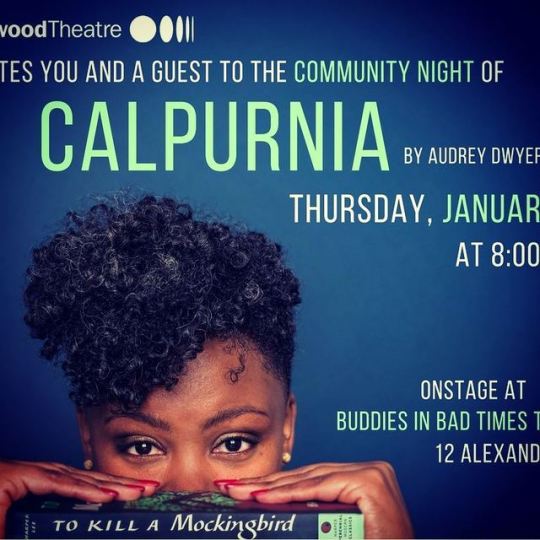
Win 2 Tickets To See #CALPURNIA presented by Nightwood Theatre + sulong theatre at the Community Screening January 18, 2018 Contest details here http://ow.ly/wWLs30hpXpb
0 notes
Text
Toronto Theatre Critics Awards: 2012 winner
Best Canadian Play: Kim’s Convenience by Ins Choi (Soulpepper Theatre)
Best International Play: The Golden Dragon by Roland Schimmelpfennig (Tarragon Theatre)
Best Production of a Play: The Small Room at the Top of the Stairs (Tarragon Theatre)
Best Director of a Play: Weyni Mengesha, The Small Room at the Top of the Stairs
Best Design: War Horse creative team (National Theatre/Mirvish Productions)
Best Actress in a Play: Nicole Underhay, The Small Room at the Top of the Stairs
Best Actor in a Play: Paul Sun-Hyung Lee, Kim’s Convenience
Best Supporting Actress in a Play: Kelli Fox, The Penelopiad (Nightwood Theatre)
Best Supporting Actor in a Play: Philip Riccio, The Test (The Company Theatre and Canadian Stage)
Best New Musical: Ride the Cyclone by Jacob Richmond and Brooke Maxwell (An Atomic Vaudeville production presented by Theatre Passe Muraille in association with Acting Up Stage Company)
Best Production of a Musical: Caroline, or Change (Acting Up Stage Company in association with Obsidian)
Best Director of a Musical: Britt Small and Jacob Richmond, Ride the Cyclone
Best Actress in a Musical: Arlene Duncan, Caroline, or Change
Best Actor in a Musical: Sahr Ngaujah, Fela! (Presented by Mirvish Productions)
Best Supporting Actress in a Musical: Deborah Hay, Caroline, or Change
Best Supporting Actor in a Musical: Elliott Loran, Ride the Cyclone
Special Citation: Eric Peterson
0 notes
Text
Unholy unpacks being a contemporary woman in organized religion
Written by: Diana Flacks Directed by: Kelly Thornton Produced by: Nightwood Theatre Shown at: Buddies in Bad Times Theatre In rapid-fire debate with complex and heart-wrenching backstories, Unholy addresses every inner conflict any woman has when considering her place in religion. Unholy is written in a talk show-style where the audience gets to vote throughout the debate on which side they agree with. Four women from drastically different religious backgrounds face off on the question, “Should women abandon religion?” On the “no” side is Yehudit Kalb, a Rabba and Maryam Hashemi, a progressive Muslim lawyer. On the “yes” side a lesbian atheist, Liz Feldman-Grant, and an ex-communicated nun: Margaret Donohue. Liz, played by Flacks, gives a forceful performance. As the women grapple over issues like the right to wear a niqab, Liz is more aggressive in her approach than the others - determined to prove that organized religion is an unnecessary evil. Maryam, played by Bahareh Yaraghi, is her fiercest opponent. The two face off in a heart versus head battle. This rivalry carries out of the debate and into their personal lives. The audience gets a glimpse into Maryam and Liz’s tumultuous relationship outside of the debate, making their moments of intense disagreement during the debate even more complex and heated. These moments provided the background context needed to understand each woman’s position. The audience sees Margaret, played by Barbara Gordon, in her past struggling with the ethics of her role as a nun. Yehudit, played by Niki Landau, takes us back to her sister’s wedding and her own internal debate there. Unholy isn’t afraid to touch on sensitive subjects. Every time the subject material moves into the uglier territories of bigotry informed by both religion and secularism, at least one of the women reigns everyone back in. Liz’s character appears deeply reflective of Flacks’ own experience turning from Judaism to atheism. Flacks researched each position and religion extensively before putting this performance together. It is this base of human experience that makes each performance so compelling. Yehudit and Maryam, women who have worked so hard in their own faiths to encourage and inspire progression, tug on your heartstrings. Liz and Margaret do the same as women who have seen the worst of religion and the damage it can do. Flacks explained in the Q & A afterwards, love, what she describes as “a great counterpoint to the damage religion and god causes,” is what lurks behind each woman’s experience and perspective. Unholy does a thorough job of unpacking the difficulty facing women involved with inherently misogynistic religions. When the host, played by Blair Williams, asks you to choose a side at the end of the play, you might’ve been surprised by your answer.
0 notes
Text
current reading list for 2019
crossed = finished
bolded = currently reading
plain = to read
CURRENTLY READING
Erotism: Death and Sensuality by Georges Bataille
Fleurs du Mal by Charles Baudelaire
Violence and the Sacred by René Girard
Selected Prose of Heinrich von Kleist
TO READ
to resume
The Horror Reader edited by Ken Gilder
The Collected Works of Clarice Lispector
Là-Bas by J.K. Huysman
On Touching by Jacques Derrida
Powers of Horror: An Essay on Abjection by Julia Kristeva
novels
The Border of Paradise by Esmé Weijun Wang
Wuthering Heights by Emily Brontë (reread)
Justine by Lawrence Durrell
Blood Meridian by Cormac McCarthy
Death in Venice by Thomas Mann (reread)
I’m Starved For You by Margaret Atwood
The Robber Bride by Margaret Atwood
The Name of the Rose (reread) by Umberto Eco
The Letters of Mina Harker by Dodie Bellamy
Story of the Eye by Georges Bataille
Sunshine by Robin McKinley
Nightwood by Djuna Barnes
Malina by Ingeborg Bachman
The Lesser Bohemians by Eimear McBride
A Girl is a Half-Formed Thing by Eimear McBride
Enfermario by Gabriela Torres Olivares
Monsieur Venus by Rachilde
The Marquise de Sade by Rachilde
Hannibal
Hannibal Rising by Thomas Harris
Monsters of our own Making by Marina Warner
“Monsters of Perversion: Jeffrey Dahmer and The Silence of the Lambs” by Diana Fuss
short stories
The Wilds by Julia Elliot
The Dark Dark by Samantha Hunt
Severance by Robert Olen Butler
poetry
Extracting the Stone of Madness by Alejandra Pizarnik
The Complete Poems by William Blake
Unholy Sonnets by Mark Jarman
collected works of Charles Baudelaire
collected works of Arthur Rimbaud
theatre
Faust by Goethe
The Tragical History of Doctor Faustus by Christopher Marlowe
nonfiction (history, biography, memoir)
Love's executioner and other tales of psychotherapy / Irvin D. Yalom.
Countess Dracula by Tony Thorne
The Bloody Countess by Valentine Penrose
Infamous Lady: The True Story of Countess Erzsebet Bathory by Kimberly L. Craft
Cannibalism: A Perfectly Natural History by Bill Schmutt
Afterlives: The Return of the Dead in the Middles Ages by Nancy Caciola
Caliban and the Witch by Silvia Federici
Blake by Peter Akroyd
The Trial of Gilles de Rais by Georges Bataille
The Marquis de Sade by Rachilde
Blake by Peter Akroyd
Dinner with a Cannibal: The Complete History of Mankind's Oldest Taboo by Carole A. Travis-Henikoff
The Dragons of Eden by Carl Sagan
Emily Brontë by Agnes Mary Frances Robinson
Lives of the Necromancers by William Godwin
A History of the Heart by Ole M. Høystad
In the Dream House by Carmen Maria Machado
essays
When the Sick Rule the World by Dodie Bellamy
Academonia by Dodie Bellamy
The Body of Frankenstein's Monster by Cecil Helman
academia
Monsters of Our Own Making by Marina Warner
Monster Culture in the 21st Century: A Reader edited by by Marina Levina and Diem My Bui
Essays on the Art of Angela Carter: Flesh and the Mirror edited by Lorna Sage
The Routledge Companion to Literature and Food edited by Lorna Piatti-Farnell, Donna Lee Brien
the gothic
Woman and Demon: The Life of a Victorian Myth by Nina Auerbach
Skin Shows: Gothic Horror and the Technology of Monsters by J. Halberstam
Perils of the Night: A Feminist Study of Nineteenth-Century Gothic by Eugenia C. Delamotte
Art of Darkness: A Poetics of Gothic by Anne Williams
Body Gothic: Corporeal Transgression in Contemporary Literature and Horror Film by Xavier Aldana Reyes
On the Supernatural in Poetry by Ann Radcliffe
The Gothic Flame by Devendra P. Varma
Gothic Versus Romantic: A Reevaluation of the Gothic Novel by Robert D. Hume
A Philosophical Enquiry into the Origin of our Ideas of the Sublime and Beautiful by Edmund Burke
Over Her Dead Body by Elisabeth Bronfen
The Contested Castle: Gothic Novels and the Subversion of Domestic Ideology by Kate Ellis
Gothic Documents: A Sourcebook, 1700-1820 by E. Clery
Limits of Horror: Technology, Bodies, Gothic edited by Fred Botting
The History of Gothic Fiction by Markman Ellis
The Routledge Companion to the Gothic edited by Catherine Spooner and Emma McEvoy
Gothic and Gender edited by Donna Heiland
Romanticism and the Gothic Tradition by G.R. Thompson
Cryptomimesis : The Gothic and Jacques Derrida's Ghost Writing by Jodie Castricano
religion
The Incorruptible Flesh: Bodily Mutation and Mortification in Religion and Folklore by Piero Camporesi
Discerning Spirits: Divine and Demonic Possession in the Middle Ages by Nancy Caciola
“He Has a God in Him”: Human and Divine in the Modern Perception of Dionysus by Albert Henrichs
The Ordinary Business of Occultism by Gauri Viswanathan
The Body and Society. Men, Women, and Sexual Renunciation in Early Christianity by Peter Brown
cannibalism
Eat What You Kill: Or, a Strange and Gothic Tale of Cannibalism by Consent Eat What You Kill: Or, a Strange and Gothic Tale of Cannibalism by Consent Charles J. Reid Jr.
Consuming Passions: The Uses of Cannibalism in Late Medieval and Early Modern Europe by Merrall Llewelyn Price
Cannibalism in High Medieval English Literature by Heather Blurton
Eating Their Words: Cannibalism and the Boundaries of Cultural Identity edited by Kristen Guest
crime
Savage Appetites by Rachel Monroe
In Cold Blood by Truman Capote
theory/philosophy
Life Everlasting: the animal way of death by Bernd Heinrich
The Ambivalence of Scarcity and Other Essays by René Girard
Interviews with Hélène Cixous
Symposium by Plato
Phaedra by Plato
Becoming-Rhythm: A Rhizomatics of the Girl by Leisha Jones
The Abject of Desire: The Aestheticization of the Unaesthetic in Contemporary Literature and Culture edited by Konstanze Kutzbach, Monika Mueller
The Severed Head: Capital Visions by Julia Kristeva
perfume & alchemy
Perfume: The Alchemy of Scent by Jean-Claude Ellena
The Perfume Lover: A Personal Story of Scent by Denyse Beaulieu
Past Scents: Historical Perspectives on Smell by Jonathan Reinarz
Fragrant: The Secret Life of Scent by Mandy Aftel
Das Parfum by Patrick Süskind
Scents and Sensibility: Perfume in Victorian Literary Culture by Catherine Maxwell
“The Ugly History of Beautiful Things: Perfume”
medicine
Blood and Guts: A History of Surgery by Richard Hollingham
Better: A Surgeon’s Notes on Performance by Atul Gawande
Being Mortal: Medicine and What Matters in the End by Atul Gawande
The Butchering Art by Lindsey Fitzharris
articles
“The Dread Gorgon” by Caroline Alexander
“Ruggiero’s Deceptions, Cherubino’s Distractions” by Mary Reynolds
“A Thing of Shreds and Patches” by J’Lyn Chapman
“Dissection” by Meehan Crist
unsorted
Dwellings of the Philosophers by Fulcanelli
Mysteries of the Cathedrals by Fulcanelli
Jean Cocteau, from ‘Orphée’
The Decameron by Giovanni Boccaccio*
FINISHED
Red Dragon by Thomas Harris
The Silence of the Lambs by Thomas Harris
Hannibal by Thomas Harris
Fever Dream by Samanta Schweblin
White is for Witching by Helen Oyeyemi (reread)
Things We Lost in the Fire by Mariana Enríquez (reread)
Painting Their Portraits in Winter: Stories by Myriam Gurba
The Sadeian Woman by Angela Carter
the collected poems of Emily Brontë
Fearful Symmetry by Northrop Frye
A Monster’s Notes by Laurie Sheck
Cain by José Saramago
House of Leaves by Mark Z. Danielewski (reread)
Such Small Hands by Andres Barba
House of Incest by Anaïs Nin
Macbeth by William Shakespeare
Hannibal Lecter and Philosophy: The Heart of the Matter edited by Joseph Westfall
The Body: An Essay by Jenny Boully
A Lover’s Discourse: Fragments by Roland Barthes
Carmilla by Sheridan le Fanu
Cabinet of Curiosities by Guillermo del Toro
John Donne’s Holy Sonnets
Surfacing by Margaret Atwood
Literature and Evil by Georges Bataille
Mr. Fox by Helen Oyeyemi
Richard III by William Shakespeare
The Dead Seagull by George barker
Power Politics by Margaret Atwood
40 notes
·
View notes